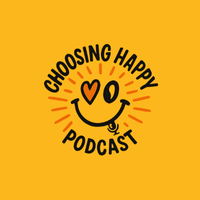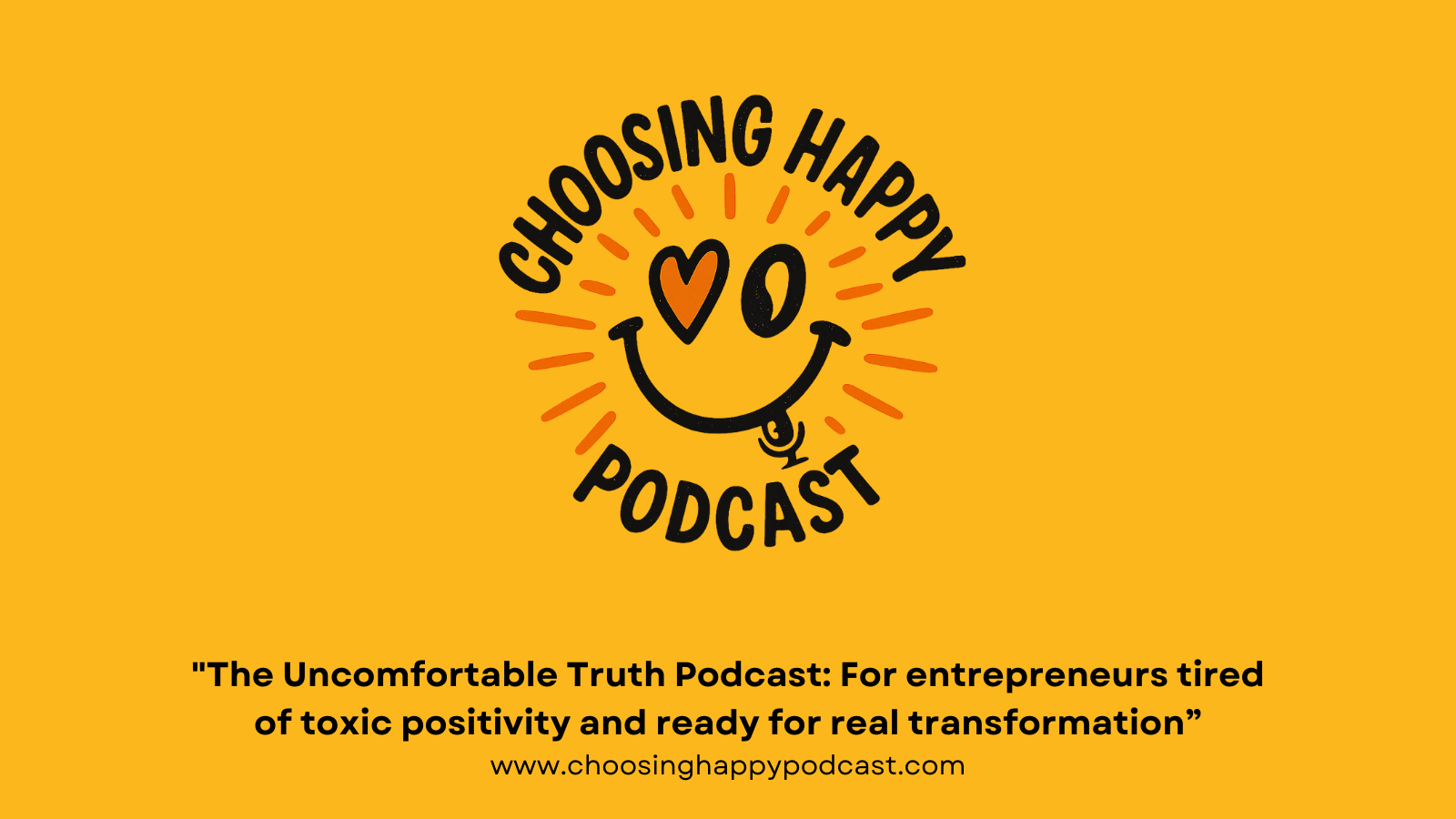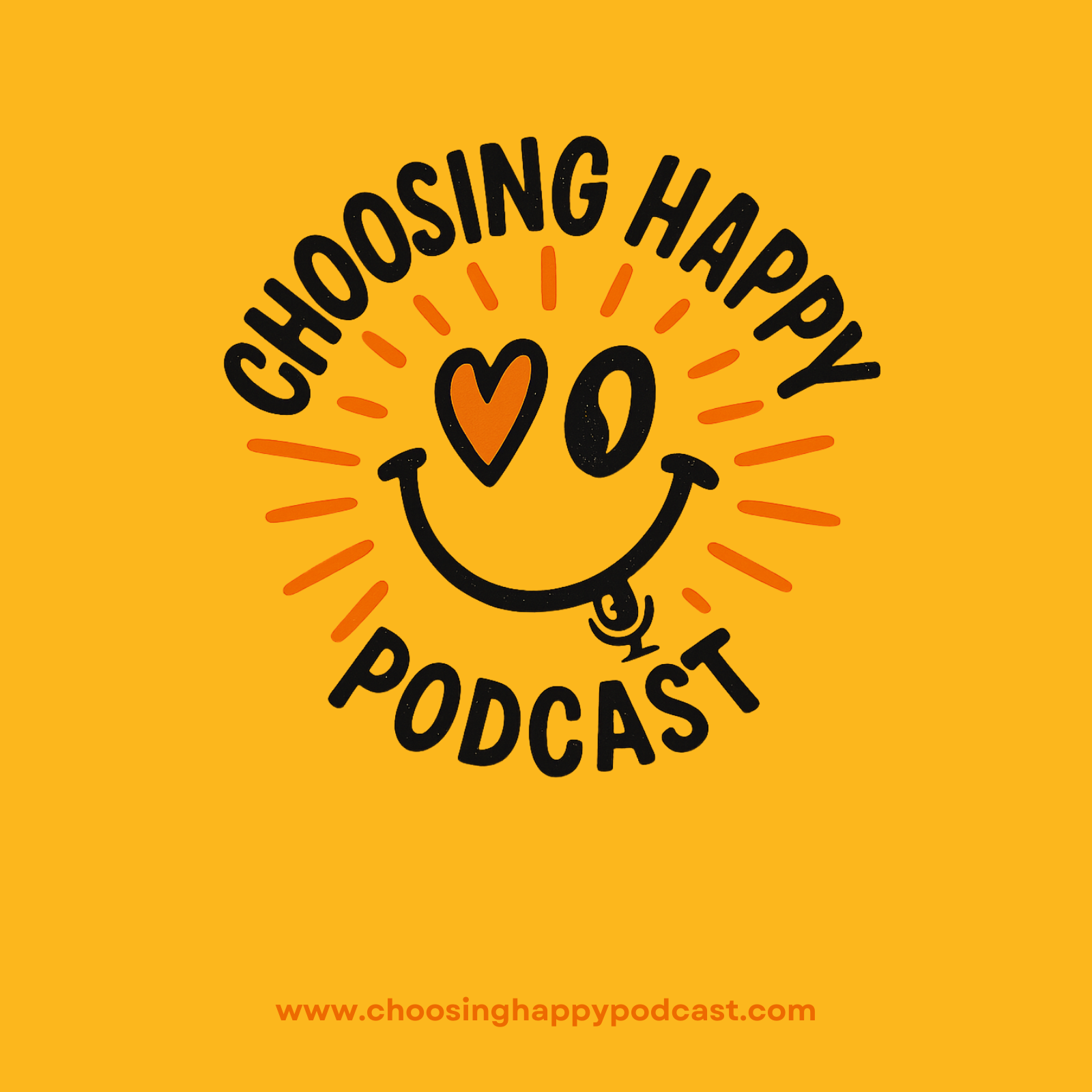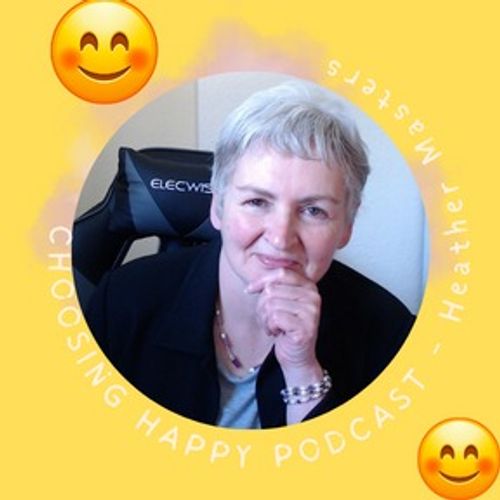Friday Fail Forward - The To-Do List Trap
Ever feel like a productivity failure because you can't get through your daily to-do list? You're not broken - you're just human. In this episode, Heather breaks down the science behind why we're terrible at estimating time and shares practical strategies to stop the self-sabotage cycle.
What You'll Learn
- Why we overestimate what we can do in a day but underestimate what we can achieve in a year
- The "planning fallacy" and how it's sabotaging your productivity
- How to audit your persistent tasks: delegate, schedule, or delete
- The 3-3-3 rule for realistic daily planning
- How to stop negative self-talk about productivity
Chapters:
- 00:07 - Introduction to Fail Forward Friday
- 00:58 - The To Do List Trap
- 05:27 - Reassessing Your Daily Tasks
- 08:43 - The Importance of Small Wins
- 10:55 - Embracing Productivity and Self-Kindness
Key Takeaways
The Planning Fallacy: We consistently underestimate task completion time by 25-50%, even with previous experience of similar tasks taking longer.
The Compound Effect: Small, consistent actions over time create massive results, but we can't see it day-to-day.
The 3-3-3 Rule: Each day, pick 3 important tasks, 3 admin tasks, and 3 small wins to celebrate.
Your Friday Challenge
Look at your current to-do list and pick the 3 things that have been there the longest. For each one, make a decision:
- Delegate it - Can someone else do this?
- Schedule it properly - Give it realistic time allocation
- Delete it entirely - Does this actually need doing?
Practical Tools Mentioned
- The Sunday Audit: Weekly review of your ongoing to-do list
- The Delegation Detector: If it's been on your list for more than a month, it needs action
- The Compound Tracker: Keep a weekly wins list to see your actual progress
Quote of the Episode
"Productivity isn't about doing more things. It's about doing the right things. And sometimes the rightest thing is to stop beating yourself up for being human."
Resources Referenced
- Daniel Kahneman and Amos Tversky's research on the planning fallacy
- The compound effect of small consistent actions
Connect with Heather
- Website: www.choosinghappypodcast.com
- LinkedIn: https://www.linkedin.com/in/heatherbond/
- Instagram: https://www.instagram.com/hvmasters/
About the Choosing Happy Podcast
The Choosing Happy Podcast is for transformational practitioners - coaches, consultants, NLP practitioners, hypnotherapists, and energy workers - who are ready for uncomfortable truths and real transformation. New episodes drop three times a week: Monday myth-busting, Wednesday real wins, and Friday fail forward sessions.
Subscribe & Review
If this episode resonated with you, please:
- Subscribe on your favourite podcast platform
- Leave a 5-star review
- Share with someone who needs to hear this message
Available on: Spotify, Apple Podcasts, Google Podcasts, and all major podcast platforms.
Episode Length: 12-15 minutes
Release Date: 15 August 2025
Tags: Productivity, Time Management, Personal Development, Coaching, NLP, Self-Compassion, Planning Fallacy
Support the Podcast with a donation: Support this Podcast
Companies mentioned in this episode:
- Daniel Kaneman
- Amos Tversky
- Marie Kondo
Transcript
Hello and welcome to the Choosing Happy Podcast.
Speaker A:Right then, gorgeous humans.
Speaker A:It is Friday.
Speaker A:A sunny Friday, but it means it's time for our weekly dose of Fail Forward Friday.
Speaker A:A bit of honesty in your ears on a Friday morning.
Speaker A:And today I'm calling out the biggest lie we tell ourselves every single day.
Speaker A:Are you ready for it?
Speaker A:I'll just quickly get through my to do list and then I can relax.
Speaker A:How is that working for you?
Speaker A:Because if you're anything like me, this list is breeding faster than rabbits and you're currently staring at it thinking you're some sort of productivity failure.
Speaker A:Well, I've got news for you.
Speaker A:You're not failing.
Speaker A:You're just here.
Speaker A:Human and humans are absolutely rubbish at estimating time.
Speaker A:Welcome to Friday Fail Forward.
Speaker A:I'm Heather, and today we're talking about the To Do List trap.
Speaker A:Why your brain is playing tricks on you, and what to actually do about it.
Speaker A:What to do about those tasks that seem to live on your list longer than some of your relationships.
Speaker A:So stay tuned for this Friday's Choosing Happy Podcast.
Speaker A:Let me paint you a picture from my week.
Speaker A:Tuesday morning, full of optimism, full of caffeine.
Speaker A:I wrote a to do list with 14 items on it.
Speaker A:14 for one day.
Speaker A:Now I'm a trained NLP trainer and practitioner and I understand how the mind works.
Speaker A:I teach people about realistic goal setting, for crying out loud.
Speaker A:And yet there I was, genuinely believing I could redesign my entire website, create a funnel with all those thank you pages and emails and write three podcast episodes, answer all of my emails and have a strategy call, walk the dog, make a proper dinner and reorganize my office all before 6pm while working with other clients.
Speaker A:And by Wednesday, I'd managed about four things.
Speaker A:By Thursday, I was having a proper go at myself for being lazy and unproductive.
Speaker A:The irony of wasn't lost on me.
Speaker A:I was literally planning an episode about self compassion while being absolutely horrible to myself about my productivity.
Speaker A:Last night I went to bed really negative and thinking, you know, am I a failure?
Speaker A:Doubting myself, doubting my ability to help others if I couldn't work productively for myself.
Speaker A:Then I remembered something a mentor told me years ago.
Speaker A:We overestimate what we can do in a day and underestimate what we can do in a year.
Speaker A:And it turns out there's actual science behind this.
Speaker A:It's called the planning fallacy, and it was discovered by psychologists Daniel Kaneman and Amos Tversky.
Speaker A:And I hope I pronounce those correctly.
Speaker A:We consistently underestimate how long tasks will take.
Speaker A:Even when we've previous experience of similar tasks taking longer, our optimistic brain just forgets the difficult bits.
Speaker A:Just, just forget the curveballs in the plan.
Speaker A:Studies show how we typically underestimate task completion time by 25 to 50%.
Speaker A:So that thing you think will take an hour is probably going to take you 90 minutes.
Speaker A:That project you've allocated a morning for, clear your afternoon too.
Speaker A:But here's the fascinating flip side.
Speaker A:While we're terrible at daily planning, we're equally terrible.
Speaker A:It's seeing a long term potential because we underestimate what we can achieve over months and years.
Speaker A:Because we can't see the compound effect of small consistent actions.
Speaker A:You see everywhere at the moment how small consistent actions lead to big wins.
Speaker A:And this is the science behind it.
Speaker A:So the lesson.
Speaker A:This is what I learned this week and what I want to share with you.
Speaker A:First, the math is working against you.
Speaker A:If you're putting more than three to five meaningful tasks on your daily list, you're setting yourself up to feel rubbish.
Speaker A:To feel like a failure.
Speaker A:Not because you're inadequate, but because you're human.
Speaker A:And humans are optimistic idiots when it comes to time estimation.
Speaker A:Try this.
Speaker A:Cut your daily list in half, then cut it in half again and see how that feels.
Speaker A:And you might be going mad in your head thinking you've got deadlines.
Speaker A:You need to do this.
Speaker A:You need to earn this money.
Speaker A:You need to get this many clients.
Speaker A:But are you getting them anyway?
Speaker A:So just give it a go.
Speaker A:Second, let's talk about those persistent little pests.
Speaker A:You know the ones.
Speaker A:Those tasks that have been on your list so long, they should be paying rent.
Speaker A:Time for some tough love and honest questions.
Speaker A:Take a look at one of those and ask, is it resistance?
Speaker A:Sometimes we don't do things because some part of us knows they're not actually important or they don't align with our values.
Speaker A:But also, it can be fear and hidden limiting beliefs.
Speaker A:Your procrastination might be trying to tell you something.
Speaker A:The next thing is to ask, can it be delegated?
Speaker A:I know, I know I can do it faster myself.
Speaker A:That's the little voice in the head.
Speaker A:But can you really?
Speaker A:And should you?
Speaker A:What's the opportunity cost of you doing everything yourself?
Speaker A:And finally, should it just be binned?
Speaker A:This is a big one.
Speaker A:Sometimes things stay on our list because we feel we should do them, not because they actually need doing.
Speaker A:Marie Kondo, your to do list.
Speaker A:Does this task spark joy?
Speaker A:Does it move you towards your goal?
Speaker A:No?
Speaker A:Then thank it for its service and let it go.
Speaker A:Now.
Speaker A:Thirdly, there's the Negative Self Talk spiral.
Speaker A:When we don't tick everything off our impossible to complete list, we start the negative self talk.
Speaker A:As I said, I was doing this last night, which is why I chose this topic today.
Speaker A:I. I'm so disorganized.
Speaker A:I never finished anything.
Speaker A:I'm just not productive enough.
Speaker A:Who would hire me?
Speaker A:But would you speak to a friend like this?
Speaker A:If your best mate came around and said, I only manage four things today instead of 14, I'm such a failure, what would you say?
Speaker A:You'd probably point out that four things is actually brilliant and that 14 was perhaps slightly ambitious, especially when it's redesigned.
Speaker A:One of them's redesigning your website.
Speaker A:So why are we treating ourselves like our worst enemy instead of our best friend?
Speaker A:The Compound Effect Reality Check here's what I want you to remember that the thing you've been working on for six months that feels like it's going nowhere, you're probably closer than you think.
Speaker A:That skill you've been developing, that business you've been building, that relationship you've been nurturing.
Speaker A:The compound effect of is working even when you can't see it.
Speaker A:We see other people's highlight reels and compare them to our behind the scenes footage.
Speaker A:But transformation, real transformation, happens in tiny increments over time.
Speaker A:It's like watching grass grow.
Speaker A:You don't see it day to day, but suddenly your lawn's two foot high.
Speaker A:The practical bits here are tips that I use and that I've been encouraged to use by coaches myself.
Speaker A:There's the 333 rule.
Speaker A:I'm sure you've heard of it.
Speaker A:Each day you pick three important tasks, three admin tasks, and three small wins.
Speaker A:You can celebrate.
Speaker A:That's it.
Speaker A:The Sunday Author Once a week, look at your ongoing to do list.
Speaker A:For each item, ask if I died tomorrow, would this matter?
Speaker A:Harsh but effective.
Speaker A:The Delegation Detector if something's been on your list for more than a month, it either needs to be delegated, scheduled properly, or deleted.
Speaker A:No exceptions.
Speaker A:The Compound Tracker Keep a weekly wins list.
Speaker A:And this I mention a lot in my podcast.
Speaker A:And it's so very, very true.
Speaker A:It's not just the big stuff, it's the small stuff too.
Speaker A:The small wins.
Speaker A:The small reasons to celebrate.
Speaker A:You'd be amazed at how much you're actually achieving.
Speaker A:And the other real good thing about the wins list is you can look at those wins and celebrate.
Speaker A:And also ask yourself, are those wins moving you toward your goal?
Speaker A:Or are you putting things on your list that you know you can win?
Speaker A:At to get that feel good dopamine feeling.
Speaker A:But is it actually getting you clients?
Speaker A:Is it actually moving you towards the goals you have in your life?
Speaker A:Is it actually moving you towards being healthier?
Speaker A:Whatever your goal is so here's your Friday challenge.
Speaker A:Look at your current to do list.
Speaker A:Pick three items that have been living there the longest and for each one, make a decision.
Speaker A:Delegate it, schedule it properly and commit to doing it a realistic time allocation, or delete it entirely.
Speaker A:And here's the kicker.
Speaker A:If you delete something, you're not allowed to feel guilty about it.
Speaker A:You're allowed to feel proud that you've been strategic with your energy.
Speaker A:And remember, productivity isn't about doing more things, it's about doing the right things.
Speaker A:And sometimes the rightest thing is to stop beating yourself up for being human.
Speaker A:If this has resonated with you, share it with someone who might need to hear it.
Speaker A:And if you've got your own to do list Horror stories.
Speaker A:Tons of them.
Speaker A:Come and tell me about them on LinkedIn or Instagram or Facebook.
Speaker A:I love hearing from fellow recovering over schedulers.
Speaker A:Next Monday, we're diving into another myth that needs busting.
Speaker A:Until then, be kind to yourself.
Speaker A:Celebrate the small wins.
Speaker A:And remember, you're not behind, you're not failing.
Speaker A:You're just human.
Speaker A:Keep choosing happy, even when your to do list is judging you.
Speaker A:Thank you so much for taking the time to listen to this episode.
Speaker A:If you enjoyed it or think it would be valuable to others, please do share.
Speaker A:And if you really enjoyed it, please leave me a review.
Speaker A:It really helps the podcast.
Speaker A:All of the links are in the show notes and I look forward to seeing you next week on the Choosing Happy podcast.
Speaker A:Sam.



